
views
X
Trustworthy Source
Centers for Disease Control and Prevention
Main public health institute for the US, run by the Dept. of Health and Human Services
Go to source
Fortunately, you can protect yourself from the virus, so try not to worry.
Practicing Social Distancing

Stay home as often as possible to avoid contact with others. The only way to truly avoid a COVID infection is to avoid contact with people who could have it. Unfortunately, it’s not easy to recognize who is contagious, especially since some people have mild or no symptoms. Until the virus threat has significantly subsided, enjoy your time at home and only go out when necessary. If you need something from the store, see if you can get it delivered before you go out to get it. Do things you enjoy, like reading a book, playing with your pets, baking, or playing games. Spending time at home doesn’t have to be boring! In most cases, you can go out for fresh air and exercise as long as the weather is pleasant. Just make sure you stay away from others.
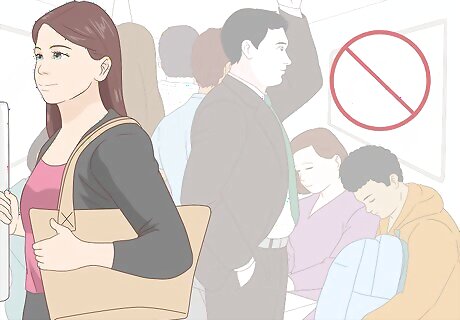
Steer clear of crowds, especially in poorly ventilated areas. The virus appears to spread faster in crowded areas, especially if there’s not a lot of fresh air circulating. When you do go out, avoid areas and events where large groups tend to gather. If you find a place getting crowded, excuse yourself and leave. You may need to skip parties and other events. You might have someone who attends bring you there virtually by doing a video call or using Facebook live. If you normally attend religious services, see if you can watch them online. You might also try doing a video call with your religious leader to connect with your faith.
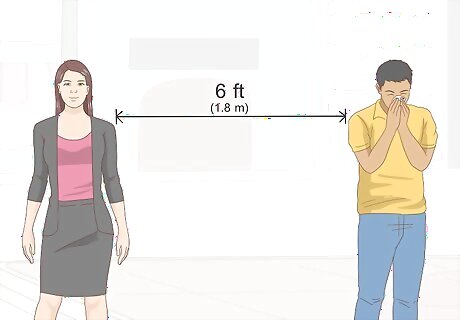
Try to stay at least 6 ft (1.8 m) away from people who are visibly ill. It’s critical for you to avoid anyone who is coughing or sneezing. Even if they have something other than COVID, it’s a possible threat to your immune system. If you see someone who appears ill, kindly distance yourself from them. If necessary, tell them nicely that you’re trying to avoid getting sick. You might say, “I see you coughing. I get sick easily, so I'd like to give you some extra space. I hope you feel better soon.”
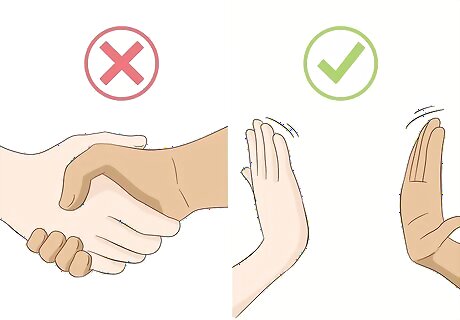
Replace hugs and handshakes with air high-fives and nods. You might normally greet your friends and family members with a hug, and handshakes are common at places like work. Instead of hugging or shaking hands, give people a fun air high-five or a nod. Other ideas include doing jazz hands, bumping elbows, or giving big waves. Figure out what feels fun for you and is safe at the same time.
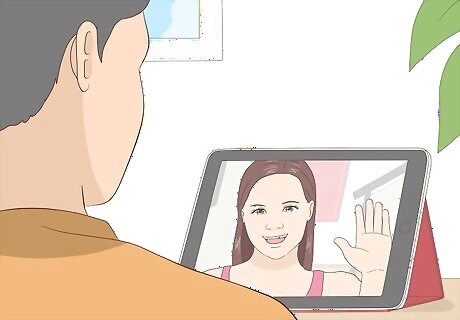
Keep in touch with loved ones using video chat, calls, and texting. Social distancing can make you feel isolated and alone, which is no fun! However, there's no need to feel like you can’t spend time with anyone. Use your electronic devices to communicate with your friends and loved ones every day. For instance, you might text your friends throughout the day and do a video call with someone every evening.Variation: Enjoy one-on-one or small group visits with people in your home or theirs, as long as it's not too large of a group. Just make sure everyone is following the CDC guidance to wash their hands and disinfect high-touch surfaces daily.
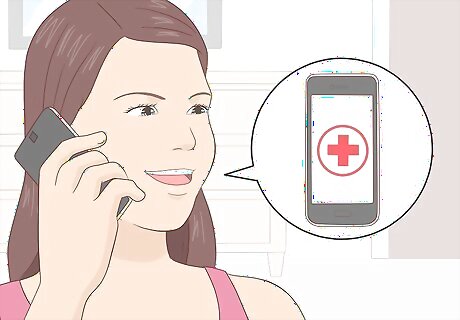
Ask your doctor if you can move to telehealth appointments. You may need to attend doctors’ appointments to monitor your condition. Call your doctor to find out if you can do these appointments via telephone or video chat. This way, you won’t have to go to the office and potentially come into contact with ill people. Telehealth appointments are becoming more common since the COVID pandemic started. Your doctor may already have this service set up for other patients. Many clinics let you do routine visits as phone or video visits. Don’t go in person unless your doctor says it’s absolutely necessary.
Protecting Yourself in Public
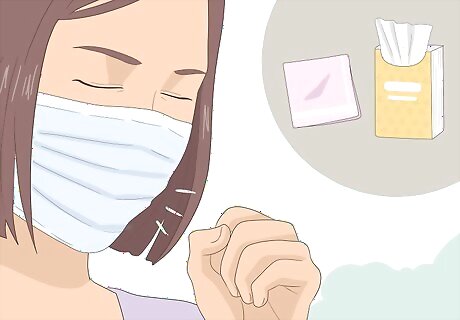
Wear a medical-grade mask (ideally N95 or better) over your nose and mouth when in public. This both reduces your risk of COVID and reduces the viral load you receive if you are exposed. Wearing a mask is less popular nowadays. Remember that your health is more important than the opinions of strangers. If people ask, just say "I'm immunocompromised and trying to stay safe." Since the Omicron variant of the virus became the dominant strain worldwide, cloth masks are no longer effective at preventing the transmission of COVID-19. Use a medical-grade surgical mask instead.
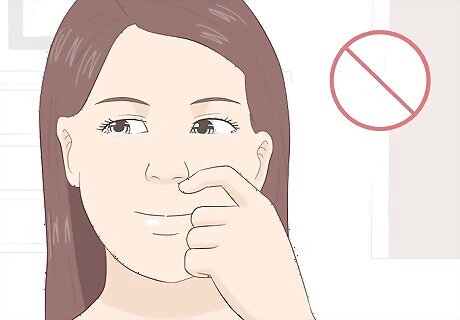
Keep your hands away from your eyes, nose, and mouth. This is a lot harder than it sounds, but it's necessary to stay safe. Your hands may come into contact with germs that are in the air or on surfaces. If you touch your face, you may accidentally infect yourself. Do your best to avoid touching your face unless you’ve just washed your hands. If possible, occupy your hands so it’s harder to touch your face. For instance, you could engage in a hobby like knitting or playing a video game while riding the bus, so your hands are busy.
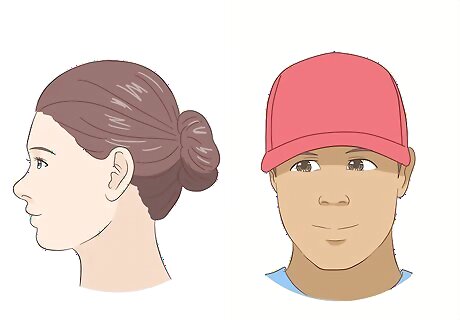
Tie up your hair or wear a hat when you go out. Your hair has a porous structure that can hold germs that you encounter in the air. Additionally, your hair is close to your face, so the germs can transfer to your eyes, nose, or mouth. When you have to leave your home, wrap long hair in a bun or cover your hair with a hat. On days you go out, wash your hair before you go to bed so you don’t accidentally transfer germs to your pillow.
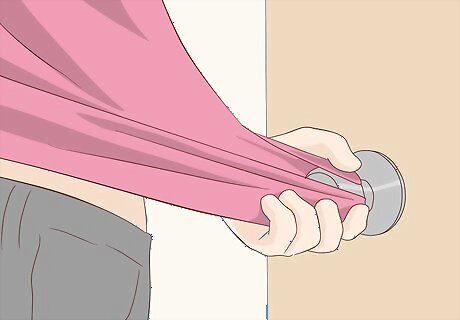
Cover your hand with a tissue or sleeve when touching surfaces in public. You might encounter COVID or other germs while out in public, especially when opening doors or using railings. To prevent yourself from picking up germs, use a tissue, the end of your sleeve, or the bottom of your shirt to cover your hand. This will help you avoid picking up the germs. If you accidentally touch a surface or forget to cover your hand, immediately clean your hands with a sanitizer or soap and water.Variation: If you don’t have a tissue and can’t use your sleeve, use your non-dominant hand to touch doorknobs and surfaces in public. You’ll likely accidentally touch your face sometimes, typically with your dominant hand. Using your non-dominant hand to touch potentially contaminated surfaces will help you limit your risk of accidentally transferring germs to your face.
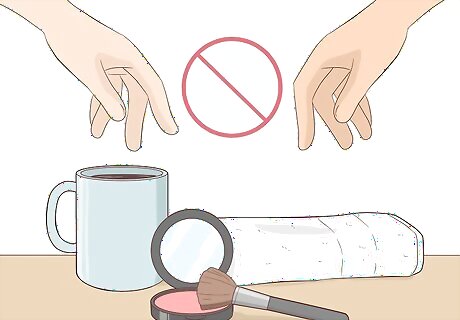
Don’t share food, utensils, or personal care products. Sharing isn’t caring when someone's health is at risk - it's quite the opposite. It’s impossible to know if someone is carrying germs, so always use clean dishes, utensils, and towels. Stick to your own plate and cup so you don’t accidentally swap saliva with someone. Additionally, use your own makeup and brushes. Some people with COVID are asymptomatic, which means they feel fine even though they have the virus. That means someone might appear well but could still infect you.
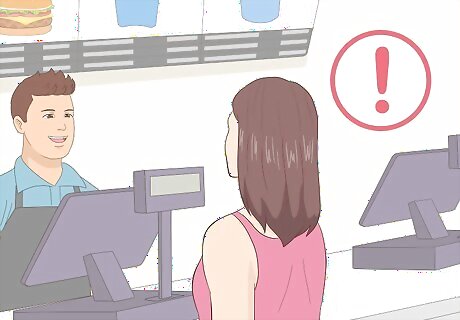
Be cautious about eating at restaurants. While eating out is fun and convenient, it may increase your risk of disease. Sick workers or customers may infect the air or even food around you. Here are some ways to enjoy restaurant food with less risk: Choose a clean restaurant that lets its workers take plenty of sick leave when they're ill. Look for signs that someone is ill, like coughing and sneezing. Notify your server that you are susceptible to illness. Choose foods that are cooked because heat can kill germs.Tip: Getting takeout or eating outdoors may be a better option than eating in an enclosed room full of strangers and their germs. You could even use a delivery app like Doordash or Uber Eats, or see if the restaurant will deliver the order to your car.
Cleaning and Disinfecting
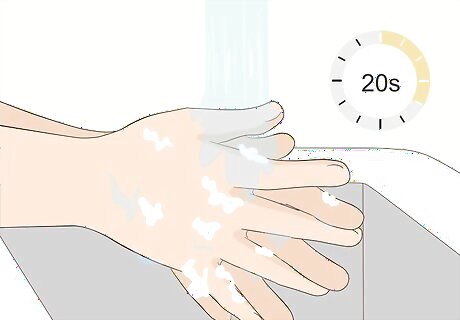
Wash your hands for 20 seconds before eating or touching your face. The CDC is recommending that people wash their hands often throughout the day, but it’s especially important to wash up before eating so that you don't transfer germs onto your food. Wet your hands with running water, then apply a mild soap to your palms. Lather for 20 seconds, then rinse your hands and dry them on a clean towel. Try singing a song like “Twinkle, Twinkle, Little Star” or "Happy Birthday" to help you wash for the full 20 seconds. According to the CDC, it doesn’t matter whether the water you use is warm or cold—both are equally good at washing away germs and viruses. Cold water is less irritating to your skin and uses up less energy. If you don’t have access to soap and water, use a hand sanitizer.Tip: Wash your hands or use hand sanitizer immediately after you cough or sneeze.
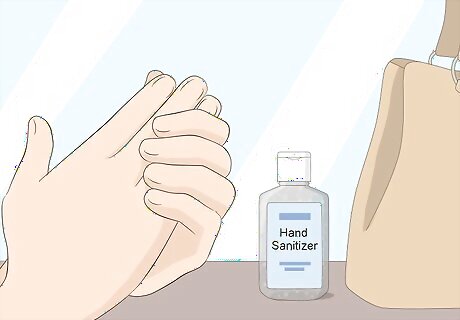
Use hand sanitizer immediately after touching surfaces in public. You likely won’t always have access to soap and water. Fortunately, hand sanitizer can protect you against COVID. Carry hand sanitizer so you can use it whenever necessary. Additionally, keep it in your car and workspace so you can sanitize your hands as often as necessary. Choose a hand sanitizer that’s at least 60% alcohol. Use lotion afterwards to prevent your skin from becoming dry and irritated.
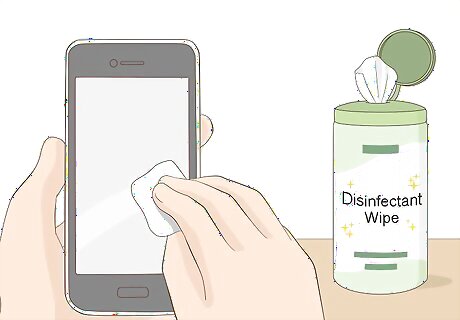
Clean your cellphone as soon as you get home from a public space. Unfortunately, your cell phone is a petri dish of germs, and those germs transfer back to your hands. Wipe your phone down with a disinfectant wipe or soapy towel to clean it. Do this at least once a day, as well as every time you get back from being in public. Don’t submerge your phone in water because you could damage it. Always use a cloth or rag to clean it.
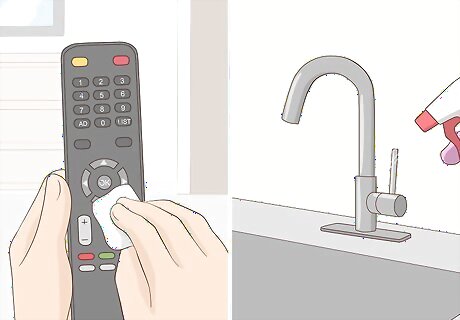
Disinfect high-touch spaces in your home daily. Germs can accumulate on surfaces that you touch all the time. Make sure you’re cleaning high-touch surfaces both at home and at work. Use a disinfectant cloth or spray to clean the following surfaces every day: Doorknobs Light switches Television remotes Toilet handles Faucet handles Kitchen and bathroom counters Bedside tables Toys Electronic devices
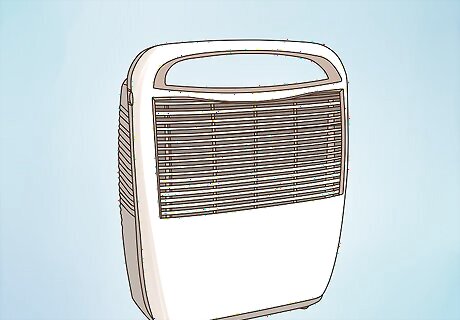
Use air purifiers at home and anywhere you spend lots of time (e.g. an office). Air purifiers can reduce the amount of virus in the air, reducing your risk. You can buy high-quality air purifiers online or even build some at home.
Protecting Your Overall Health
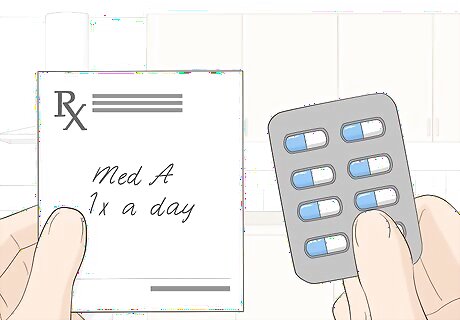
Follow your treatment plan to keep a medical condition under control. Don’t let your worries about COVID distract you from managing your health. Continue to take any medications that your doctor has prescribed. Additionally, stick to your healthy lifestyle choices. If you have any questions about your treatment, ask your doctor for help. They’ll be able to help you protect yourself from COVID and stay as healthy as possible. If you need to have regular appointments related to a chronic illness or to get medication refilled, schedule telehealth visits until you can visit the clinic in person again. Continue to take any medications unless your doctor tells you otherwise.Warning: Never stop taking any of your medications without talking to your doctor first. For instance, don’t stop taking immunosuppressants because you’re worried about getting sick, as your underlying condition may worsen. Do not delay care for emergencies or other serious health conditions. You may feel like you should avoid seeking healthcare to reduce your chances of getting the virus, but other conditions can still harm your health, and it is very risky to delay care.
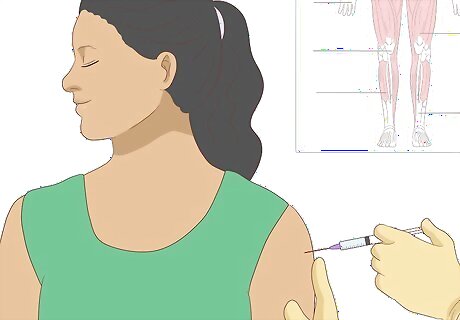
Get vaccinated. Get vaccinated if a vaccine is available to you. Several vaccines have been approved for emergency use in the US and around the world. Whether you are eligible to receive the vaccine depends on the specific regulations in your area and if there are local supplies available. Generally people with medical conditions that put them at risk will be eligible to receive the vaccine earlier than others, but you will still need to make an appointment yourself. Ask your doctor for recommendations for what's best for you. You are unlikely to be able to choose which vaccine you will receive when you get an appointment because supplies are limited. However, each vaccine has shown excellent protection against COVID-19 in trials and greatly reduces your chances of severe disease and hospitalization. Keeping up with your other vaccinations can help prevent other diseases that might cause serious health problems.
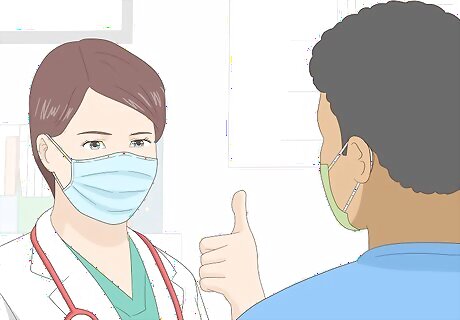
Schedule in-person doctor appointments first thing in the morning. That way, you can arrive in a quieter building with fewer people (and airborne germs) around. You can also call ahead to explain your situation and ask what protections they have to prevent the spread of disease. People at the office may be willing to wear N95 masks while you're there. Try bringing some extras.
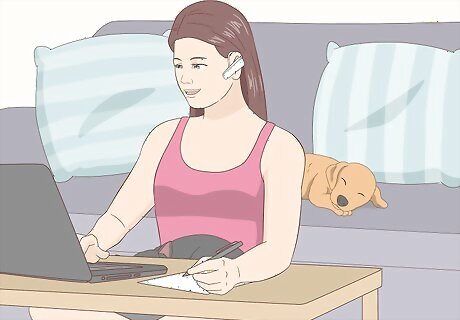
Ask your boss if you can work from home if possible. With the coronavirus outbreak, the CDC and the WHO are recommending that businesses allow employees to work at home whenever possible. Talk to your boss about this possibility if you currently work outside your home. They may be able to work with you. If you can’t work from home, your boss might be able to modify your schedule or to institute new cleaning processes. Your request to stay medically safe may fall under the umbrella of disability accommodations.

Avoid non-essential travel and cruising until the outbreak is over. You might encounter an infected person while traveling. Plus, some areas are experiencing an outbreak right now. The CDC recommends that people who are at a higher risk for COVID infection and complications stop traveling until the virus is under control. If you must travel, check the CDC and WHO travel updates before you go.
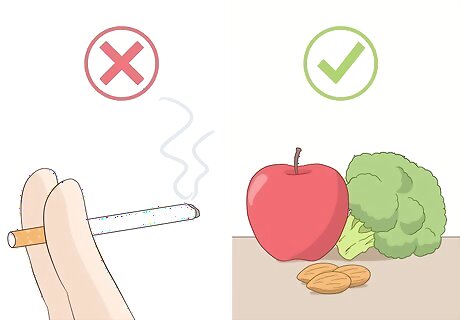
Make healthy choices to support your immune system. While a healthy lifestyle won’t guarantee that you won’t get sick, it may help you avoid an infection. Play it safe by following this healthy advice: Base your diet around vegetables, lean protein, and fruit. Exercise for 30 minutes a day 5-7 days a week. Incorporate stress relievers into your day. Sleep for 7-9 hours a night. Limit alcohol if you drink it. Don’t smoke.
Collecting Food and Necessities
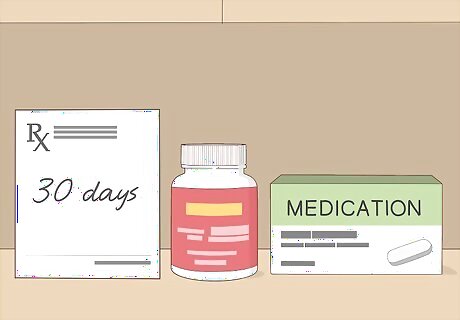
Keep a 30-day supply of your medication at home. You likely don’t need to worry, but you may need to stay home for an extended period of time. The CDC recommends being prepared for 2-4 weeks of self-isolation, so make sure you have enough medication on hand. Contact your doctor or pharmacy to ask about getting a refill if necessary. Your doctor and pharmacy can help you figure out when you should get your refills. They may be able to ship your medications to your home, as long as they’re not controlled substances.
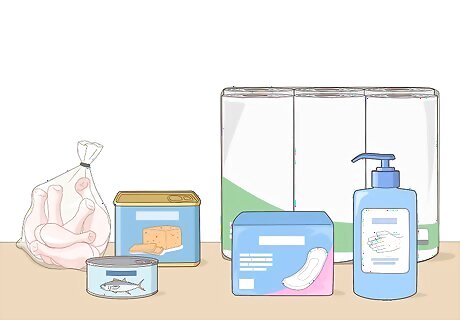
Buy extra food and essentials in case there’s an outbreak. You’ve probably seen reports about people buying up all the toilet paper, but that’s not necessary. You just need enough extra supplies to cover you for two to four weeks at home. If you can, buy extra food and household items so you’ll have them in case you can’t leave home to go shopping. Stock your pantry with about 4 weeks’ worth of non-perishable foods and freeze about 1-2 weeks’ worth of perishables like meat or bread. Plan to have 2-4 weeks’ worth of things like soap, personal care products, cleaning supplies, toilet paper, sanitary pads, tampons, diapers, and laundry detergent. For instance, this might mean buying 1 or 2 extra packs of toilet paper or an extra bottle of soap.
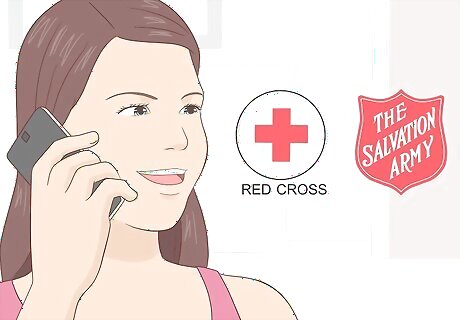
Reach out to local nonprofits if you need help getting supplies. You may not have any extra money in your budget for extra food and supplies, especially if you’re losing work because of the outbreak. Fortunately, nonprofits and faith-based organizations are stepping in to help. Contact your local food bank, the Red Cross, the Salvation Army, or your faith organization to ask about help. You may be able to get food and other necessities. You are very important, so don’t hesitate to reach out for help. Some organizations have already prepared bags for people at-risk who need to stay home, so they’ll be happy if you claim one. Some school districts are offering free lunches for low-income kids and families, so the kids still have access to nutritious food while school is closed.













Comments
0 comment